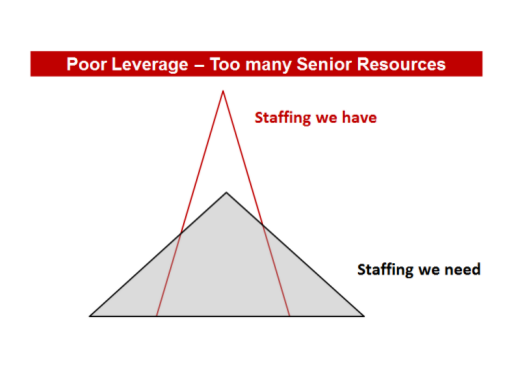Integration Practice: How to make your BizTalk practice more profitable?
Idea in brief

Managing an integration practice is significantly different than managing integration projects. With it comes all the on-going challenges such as hiring, delivery, training, and transitioning between projects.
I have identified four major challenges that an integration practice lead has to address. These are low leverage, fragmented project pipeline, high bench cost and systematic under-delegation.
The challenges can be addressed by improving the net income per engagement, cross-training & skill development of consultants, adopting blended practice model, and efficient scheduling of projects. I have discussed each challenge and its solution below.
Challenges
1. Low leverage
Having a high partner-to-staff or senior-to-junior ratio on each project, even the ones that can be easily delegated, essentially means that you get a low-skill work done by a high-skill resource. Watch out if your integration practice looks the following pyramid.

Doing routine, non-specialized work and that too with a high staff-to-partner ratio reduces the overall profitability of an integration practice. This is essentially the problem of balancing the right number of finders, minders, and grinders (partners, managers, & staff/consultants) per project. Integration practice leads can invest time in learning how to shuffle and source staff for improved future profitability.
2. Project pipeline fragmentation
BizTalk has become 15 years old & mature product and much hype around SOA (service-oriented architecture) has dwindled. Microsoft has gradually reduced pushing BizTalk. The overall adoption path of the technology shows that it has already been adopted with 11k licenses sold globally.
The new normal is ‘small pockets’ of work with a decrease in the number of new clients (save the periodic customization and support projects). Only new triggers (such as regulatory requirements or adoption pressure by large customers) can push the adoption of BizTalk in B2B scenarios.
Thus, the maturity of the platform has resulted in a slow and fragmented pipeline of new projects. Managing large integration teams has increasingly become less profitable. This is not easy given the project-related dips and spikes that practice leads have to manage.
3. High bench cost
The true cost of an employee is double the nominal cost.
A lot of companies maintain an integration practice and it is necessary for keeping a foot in accounts. They don’t want to let it go. But having to maintain BizTalk practice just to keep your foot in the door may result in the following scenarios.
- Resources not billed 1500 hrs/ year/ consultant
- Difficulty in achieving 70% realization for each consultant’s maximum available time
Both these situations are not welcome and significantly affect the long-term financial health of the practice. Typically, the U.S firms ship such projects offshore. Having offshore partners allows them to keep their foot in the door while managing their bench cost through nearshore or offshore resources.
Hiring resources above the average amount of work in a typical practice year increases the non-billable hours per FTE that your practice has to afford every year. The reason behind this strategy may be a lack of knowledge about alternative options about the availability of high-skilled nearshore or offshore resources or lack of working relationships with partners in the same domain within the same locality.
4. Systematic under delegation
No other problem will reduce a practice’s profitability as much as the systematic under-delegation issue. Consider it as a bad habit and no other habit harms a consulting practice profitability as much as the habit of high-priced people performing lower-value tasks.
Fear of losing jobs often results in under delegation. If you have an overqualified person doing a mundane job, it is time to think of the alternative options of delegating the work to cost-efficient local, nearshore or offshore partners.
This habit is so widespread that we find it in all types and form of IT services companies, from BizTalk shops to SharePoint and mobile development consulting firms. A careful estimate by David Maister puts this estimate at 40-50%.
That is to say, 40-50% of a consulting firm’s entire productive capacity is spent by senior people doing the work that a well-trained junior can handle. You may perform a quick exercise. Make a list of current projects and consider the percentage of resources that cost you 40-50% more expensive than necessary to maintain the same level of quality.
How systematic under delegation decreases practice profitability? It does in two manners. One, it puts you (as a practice) at a competitive disadvantage. Two, you may find it difficult to market your firm as an efficiently staffed integration services firm.
Solutions
1. Project/Engagement management
- Improving the net income per engagement through
- Properly staffing and with a right ratio of senior-to-junior in each integration project.
- Rightshoring (leveraging nearshore and offshore staff for routine work & assigning client facing specialized tasks to senior onshore resources)
- Insourcing vs. outsourcing. (keep only people on team for permanent work and delegate the fragmented work
2. Cross-training (across technologies and disciplines) & skill development
- Staff who is currently non-billable should be trained in the complementary technologies so that they can be assigned to other projects should the need arise. (Training the integration teams for SharePoint/Power BI platforms)
- Cross training also helps in achieving an important goal of target billing on average 1,500 hours/year/consultant
- Using experienced offshore partners to acquire BizTalk resources for 200-300 hours per year that will let you maintain a practice
- Training the technical team for marketing and sales activities
A related challenge of this practice may be the dilution of specialization.
3. Blended practice model
- Establishing and maintaining close relationship with nearshore and offshore partners to manage the infrequent workloads
- Investing time in selecting the right nearshore/offshore partners and adopting the right way of doing it (as good trustable partners cannot be shopped around and require investing time in selecting them)
- Local partners that have an established/new practice in BizTalk
4. Efficient scheduling of projects
Integration projects are difficult to manage since they involve external parties with several issues that integration team has to handle (such as approval process, delay in response by third parties, server crashes, etc.). All these dependencies increase the amount of time it actually takes to integrate applications and ERPs. Here comes the role of efficient scheduling of projects.
You can pad your project’s schedules. This is to say that a 6 weeks project can be negotiated as a 10-12 weeks project (and give discount against padded projects). This allows the practice lead to improving the realization of each resource on the team. Having your team intermittently work on multiple projects (simultaneously) will allow you to offset the fragmented work schedules (a norm in integration projects involving multiple parties).







